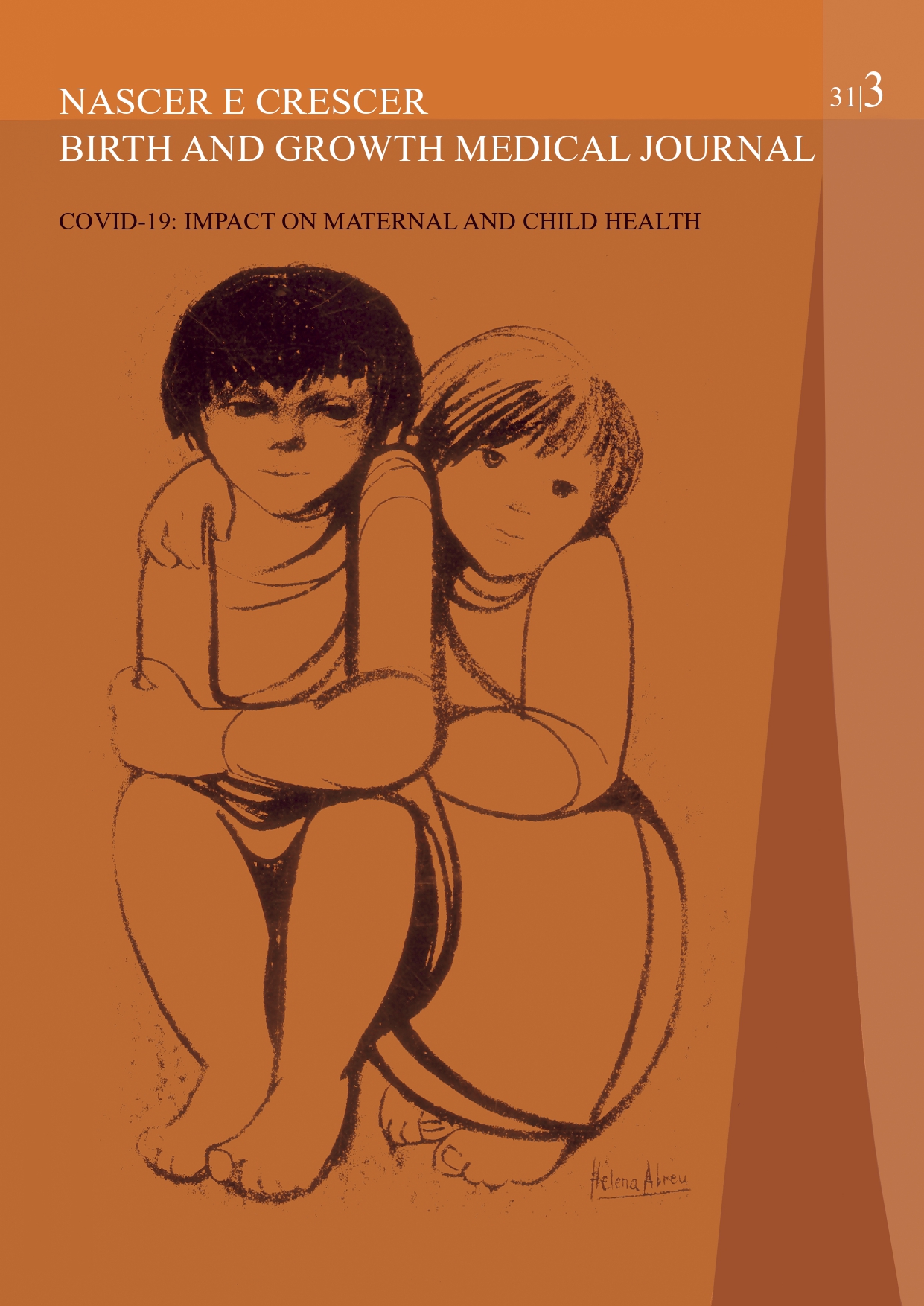SARS-CoV-2 infection in children with cystic fibrosis: Experience of a Portuguese reference centre
DOI:
https://doi.org/10.25753/BirthGrowthMJ.v31.i3.27540Keywords:
child, coronavirus, COVID-19, cystic fibrosis, SAAbstract
Introduction: Respiratory viruses are often responsible for pulmonary exacerbations and increased morbimortality in patients with cystic fibrosis (CF). For this reason, SARS-CoV-2 was expected to have a significant impact on the respiratory status of these patients, especially in those at risk. Detailed data of the clinical course of COVID-19 in children with CF is scarce.
Objectives: The aim of this study was to determine the incidence, clinical characteristics, and course of COVID-19 infection in pediatric patients with CF.
Material and methods: This was a retrospective observational study of children with CF and SARS-CoV-2 infection followed at a Portuguese reference centre between March 2020 and March 2022.
Results: Twelve of 30 children with CF were infected by SARS-CoV-2 (40%), in a total of 13 episodes. The median age was 10.5 years, and 33% were male. Most cases (69%) occurred between January and March 2022, when Omicron was the predominant variant. The infection rate was higher in children not fully vaccinated. None of the children with additional risk factors was infected. Ninety-two percent of patients presented with mild disease and one child with low body mass index was hospitalized with pneumonia. None required oxygen therapy or admission to the Intensive Care Unit. No cases of mortality were reported. Eighty-three percent of patients fully recovered after two months of follow-up.
Discussion: In this first national study of children with CF and COVID-19 infection, most children presented with mild disease and could be safely managed at home.
Conclusion: This study is in line with the few evidence available in the literature and contributes to a better understanding of SARS-CoV-2 infection in children with CF during predominance of the Omicron variant, providing additional data that can guide families and clinical teams in the management of patients.
Downloads
References
Páez-Velásquez JS, Romero-Uribe IE, Castilla-Peón MF, Lezana-Fernández JL, Chávez-López A. SARS-CoV-2 infection in a pediatric patient with cystic fibrosis. Bol Med Hosp Infant Mex. 2021;78(1):29-33. doi: https://doi.org/10.24875/BMHIM.20000216.
Colombo C, Burgel PR, Gartner S, van Koningsbruggen-Rietschel S, Naehrlich L, Sermet-Gaudelus I, Southern KW. Impact of COVID-19 on people with cystic fibrosis. Lancet Respir Med. 2020 May;8(5):e35-e36. doi: https://doi.org/10.1016/S2213-2600(20)30177-6.
Al Yazidi LS, Al Maskari N, Al Reesi M. Children with cystic fibrosis hospitalised with covid-19: multicentre experience. J Paediatr Child Health. 2021 May;57(5):767-768. doi: https://doi.org/10.1111/jpc.15495.
Bain R, Cosgriff R, Zampoli M, Elbert A, Burgel PR, Carr SB, et al. Clinical characteristics of SARS-CoV-2 infection in children with cystic fibrosis: An international observational study. J Cyst Fibros. 2021 Jan;20(1):25-30. doi: https://doi.org/10.1016/j.jcf.2020.11.021.
Cosgriff R, Ahern S, Bell SC, Brownlee K, Burgel PR, Byrnes C, et al. Global Registry Harmonization Group. A multinational report to characterise SARS-CoV-2 infection in people with cystic fibrosis. J Cyst Fibros. 2020 May;19(3):355-358. doi: https://doi.org/10.1016/j.jcf.2020.04.012.
Fleming-Dutra KE, Britton A, Shang N, Derado G, Link-Gelles R, Accorsi EK, et al. Association of prior BNT162b2 COVID-19 vaccination with symptomatic SARS-CoV-2 infection in children and adolescents during Omicron predominance. JAMA. 2022;327(22):2210-2219. doi: https://doi.org/10.1001/jama.2022.7493.
DGS. Norma nº 004/2020 de 23/03/2020 atualizada a 05/01/2022 – Abordagem das Pessoas com Suspeita ou Confirmação de COVID-19.
Lee TWR, Brownlee KG, Conway SP, Denton M, Littlewood JM. Evaluation of a new definition for chronic Pseudomonas aeruginosa infection in cystic fibrosis patients. J Cystic Fibros. 2003;2(1):29–34. doi: https://doi.org/10.1016/S1569-1993(02)00141-8.
Downloads
Published
How to Cite
Issue
Section
License
Copyright (c) 2022 Mafalda Moreira, Patrícia Sousa, Sara Catarino, Inês Azevedo

This work is licensed under a Creative Commons Attribution-NonCommercial 4.0 International License.
Copyright and Authors' Rights
All articles published in Nascer e Crescer - Birth and Growth Medical Journal are Open Access and comply with the requirements of funding agencies or academic institutions. For use by third parties, Nascer e Crescer - Birth and Growth Medical Journal adheres to the terms of the Creative Commons License "Attribution - Non-Commercial Use (CC-BY-NC)".
It is the author's responsibility to obtain permission to reproduce figures, tables, etc. from other publications.
Authors must submit a Conflict of Interest statement and an Authorship Form with the submission of the article. An e-mail will be sent to the corresponding author confirming receipt of the manuscript.
Authors are permitted to make their articles available in repositories at their home institutions, provided that they always indicate where the articles were published and adhere to the terms of the Creative Commons license.


